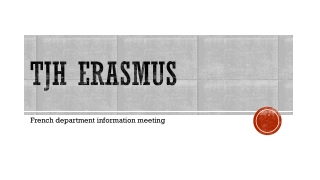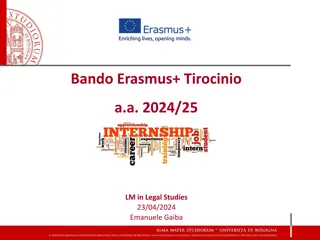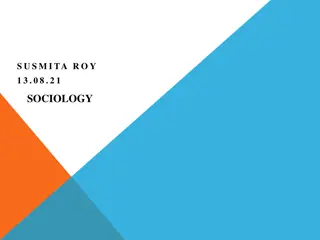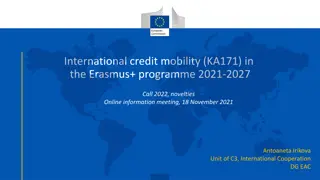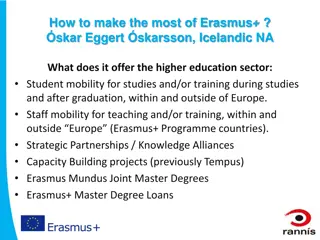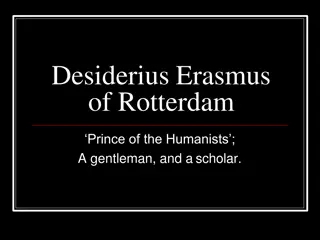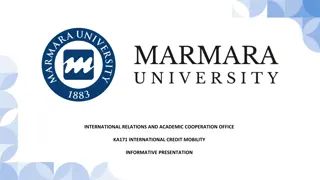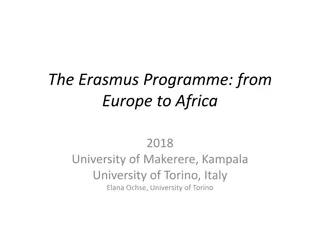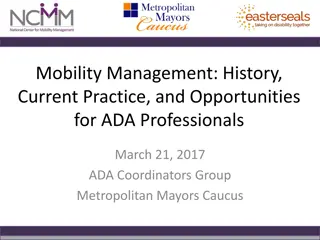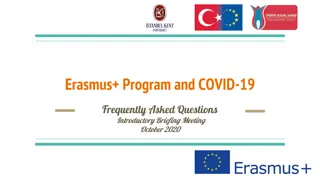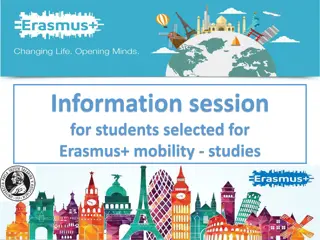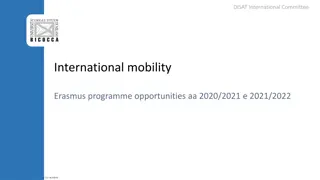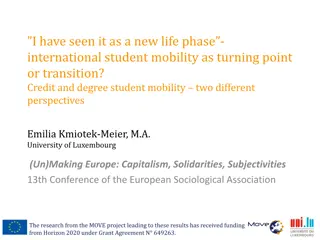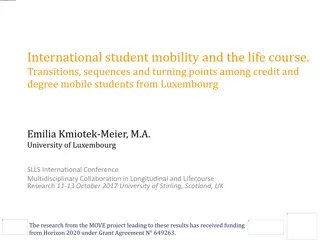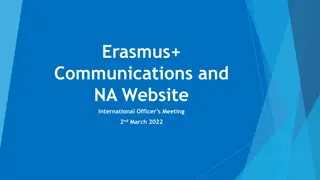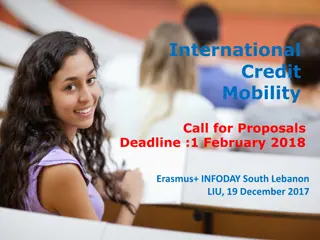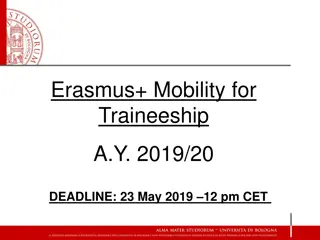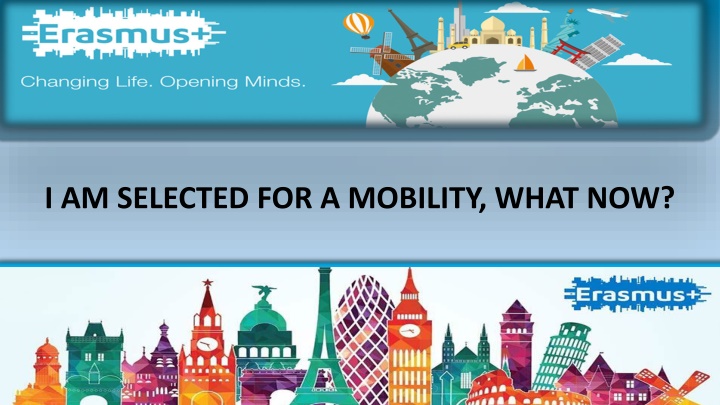
Selected for Mobility: Understanding Erasmus Traineeship
Erasmus+ Traineeship offers students and recent graduates the opportunity to gain valuable work experience abroad, develop key competencies, and enhance their employability. Participate in traineeships to apply theoretical knowledge in practical settings, enhance communication, teamwork, and problem-solving skills, and expand your qualification profile for personal and professional growth.
Download Presentation

Please find below an Image/Link to download the presentation.
The content on the website is provided AS IS for your information and personal use only. It may not be sold, licensed, or shared on other websites without obtaining consent from the author. If you encounter any issues during the download, it is possible that the publisher has removed the file from their server.
You are allowed to download the files provided on this website for personal or commercial use, subject to the condition that they are used lawfully. All files are the property of their respective owners.
The content on the website is provided AS IS for your information and personal use only. It may not be sold, licensed, or shared on other websites without obtaining consent from the author.
E N D
Presentation Transcript
WHAT IS ERASMUS+ TRAINEESHIP WHAT IS ERASMUS+ TRAINEESHIP spending a period of time in a company or organization in another country which is member state of the Erasmus+ program (EU) in order to acquire the specific skills required in the labor market, gain work experience and gain a better understanding of the economic and social culture of the country concerned
MAIN OBJECTIVES OF THE MAIN OBJECTIVES OF THE TRAINEESHIPS TRAINEESHIPS to stimulate and intensively support the education and training of university students and fresh graduates through practical training abroad to apply the theoretical knowledge and practical skills acquired in the student's study field in a specific work environment to acquire new knowledge and skills and strengthen key competencies such as effective communication and communication in a foreign language, intercultural competence, teamwork, organizational skills, problem solving, information literacy, creativity, etc. to expand the qualification profile of students and fresh graduates, contribute to their professional and personal growth and increase their attractiveness in terms of employability
WHO CAN PARTICIPATE WHO CAN PARTICIPATE STUDENTS all duly registered students for the full-time and part-time study programs at all levels of study bachelor, magister, doctoral from the 1st year of the 1st level of study RECENT GRADUATES can realize their mobilities within 12 months after their graduating student has to be selected durig the last year of study lenght of the mobility depends from lenghts of the previous mobilities
TYPES OF TYPES OF TRAINEESHIPS TRAINEESHIPS LONG -TERM MOBILITIES traineeship in field of study for students or recent graduates traineeship for recent graduates in field of study or in digital skills traineeship in digital skills for students of recent gratudates SHORT- TERM MOBILITIES short term mobility for PhD. students or recent graduates after third level of study
TRAINEESHIP FOR STUDENTS TRAINEESHIP FOR STUDENTS realized during the study for all levels of study (Bc., Mgr., PhD.) in relevant field of study or in digital skills traineeship is embedded in the curriculum or could be voluntary minimum duration 2 months maximum duration 12 months for study level or 24 months for one study cycle program (medicine or dentistry)
TRAINEESHIP FOR RECENT GRADUATES TRAINEESHIP FOR RECENT GRADUATES recent graduates can realize traineeship within 12 months after their graduation selection procedure has to proceed during the last year of study maximum duration depends from the previous lenghts of the mobilitities for study or for traineeship (long-term and short-term) maximum duration 12 months for study level or 24 months for one study cycle program (medicine)
TRAINEESHIP IN DIGITAL SKILLS TRAINEESHIP IN DIGITAL SKILLS available for all study programs for students or recent graduates possibble activities are: app maintenance and management of IT systems and networks; cybersecurity; data analytics, artificial intelligence applications; programming languages; search engine optimisation (SEO) and digital marketing for more information click here development and software; installation,
SHORT TERM TRAINEESHIP FOR PHD. SHORT TERM TRAINEESHIP FOR PHD. STUDENTS STUDENTS lasts from 5 to 30 days only for students of third level of study the same procedure as for the long time mobilities activities focused on completing training work skills, non-academic experience, research skills, research the student must choose this type of traineeship when register for the selection procedure
LENGTH OF THE LENGTH OF THE TRAINEESHIPS TRAINEESHIPS MINIMUM: 2 months (6O days) for long-term mobility 5 days for short-term mobility for PhD. students each month is considered to be 30-day long in case of an incomplete month, the grant is calculated according to the number of days (1 day = 1/30 monthly rate) tool: grant calculator
MAXIMUM: total time abroad may not exceed 12 months within one cycle of study either as a student mobility for study or as a trainee or recent graduate, including long- term mobilities and shor-term mobilities, too in case of one cycle study fields, e.g. medicine or dentistry the total time is 24 months
THE RECEIVING INSTITUTION CAN BE: THE RECEIVING INSTITUTION CAN BE: any public or private organization active in the labour market or in the fields of education, training and youth: a public or private, a small, medium or large enterprise (including social enterprises); a public body at local, regional or national level; a social partner or other representative of working life, including chambers of commerce, craft/professional associations and trade unions; a research institute and foundation; a school/institute/educational centre (at any level, from pre-school to upper secondary education, and including vocational education and adult education); a non-profit organization or association, a body providing career guidance, professional counselling and information services; university (a Programme Country HEI awarded with an ECHE)
THE RECEIVING INSTITUTION CAN NOT BE: THE RECEIVING INSTITUTION CAN NOT BE: EU institutions and other EU bodies including specialized agencies (their exhaustive list is available on the website organizations managing EU programs such as Erasmus+ National Agencies (in order to avoid a possible conflict of interests and/or double funding)
FINANCING FINANCING since the Erasmus+ financial support is only a contribution to cover the costs associated with your mobility, please verify other options of funding (salary from the host organization, savings, etc.) Financing scheme : 80% before the mobility after signing financial agreement 20% after the mobility when all condition are fullfiled in addition to the Erasmus+ grant you can also receive salary from the receiving organization. The payment may be financial or e.g. in a form of accommodation, public transport tickets, meals, etc.) the student is not allowed to use the Erasmus+ grant to cover similar mobility costs if she/he has already been funded from other European Union sources the lump sum for a month is intended to cover general costs connected to a mobility as well as travel costs
B BASIC RATES OF INDIVIDUAL SUPPORT FOR ASIC RATES OF INDIVIDUAL SUPPORT FOR A LONG A LONG- -TERM MOBILITY TERM MOBILITY AND TOP AND TOP- -UPS UPS: : Target country Grant/month - study mobility Denmark, Finland, Ireland, Iceland, Lichtenstein, Luxemburg, Norway, Sweden 670 / month Belgium, Cyprus, France, Greece, Netherlands, Malta, Germany, Portugal, Austria, Spain, Italy Bulgaria, Croatia, Czech Republic, Estonia, Lithuania, Latvia, Hungary, Slovenia, Poland, Romania, the Republic of North Macedonia, Serbia, Turkey 620 / month The mobility participants with fewer opportunities are entitled to a top-up amount of 250 / month above the basic grant. Students can obtain support for green travel. In this case, they will receive a single contribution of EUR 50 as a top-up to the individual support
B BASIC RATES OF INDIVIDUAL SUPPORT FOR ASIC RATES OF INDIVIDUAL SUPPORT FOR A SHORT A SHORT- -TERM MOBILITY TERM MOBILITY AND TOP UPS AND TOP UPS: : Participants of short-term mobilities (5-30 days) are entitled to individual support for physical mobilities, including travel days, regardless of the target country: Day 1-14 Day 15-30 Target country Grant/day Grant/day All programme countries 70 50 Mobility participants with fewer opportunities are entitled to a top-up amount of 100 above the basic rate for a physical mobility lasting 5-14 days and of 150 for a physical mobility lasting 15-30 days. Support for travel costs is granted to participants with fewer opportunities. The travel grant is covered by a special range of fixed amounts according to the distance bands valid for the whole program: Distance band From 10 to 99 km: From 100 to 499 km From 500 to 1 999 km: From 2 000 to 2 999 km: From 3 000 to 3 999 km: From 4 000 to 7 999 km: 8 000 km or more: Standard travel 23 EUR/participant 180 EUR/participant 275 EUR/participant 360 EUR/participant 530 EUR/participant 820 EUR/participant 1 500 EUR/participant Green travel 210 EUR/participant 320 EUR /participant 410 EUR /participant 610 EUR /participant
TYPES OF SUPPORT FOR THE STUDENTS WITH FEWER OPPORTUNITIES Group Disability Description As a person with a severe health disability (hereinafter referred as a person with a SHD) is considered a person with a functional impairment rate of at least 50% . Type of support Top-up and real costs (if top-up is not enough) Proof possibilities ZP card (Disability card) + application+ consent to the processing of a special category of personal data Medical report and/or financial contribution decision from PSVaR (labor office) and/or a student with special needs status - Counseling Center report Health problems As a person with a health problem is considered a person with a chronic illness or psychiatric illness. Top-up Economic barriers low standard of living, low income (eg. family in social need) dependence on the social security system (eg. orphan's pensioner, unemployment benefits) Top-up Social scholarship and/or - confirmation of material need from the PSVaR (labor office) Social barriers Social adaptation difficulties: a single parent with a child (ie. a single woman or a single man who is permanently taking care for a child under the age of 15), discrimination barriers Top-up Depending on the situation: Statutory declaration (own form) Others Different types of barriers (eg. ethnic origin, migrants, etc.) - depending on the university s decision Top-up Depending on the situation: Statutory declaration (own form)
GENERAL GENERAL RULES RULES FOR TRAINEESHIPS FOR TRAINEESHIPS traineeships should be planning as full time job of the receiving country the student is responsible for the communication with the receiving organization the preparation of the program for the traineeship has to be ensured by the student in cooperation with faculty/departmental/institute/coordinator before leaving for an Erasmus+ mobility for traineeship the student should find out what are his/her responsibilities at the home faculty/department/institute that are connected to his/her regular studies at the home institution students cannot participate in an Erasmus+ mobility for traineeship, if their study at the UPJ is interrupted students have to finish their Erasmus+ mobility for traineeship before the date of the state examinations, if they participate in an Erasmus+ mobility during their last year in the study cycle the receiving organization and
if student wants to participate in an Erasmus+ mobility for traineeship during the last year in the study cycle, it faculty/department/institute whether it is possible to participate taking into consideration the responsibilities before finishing their studies and attending state examinations the interruption of a mobility is not allowed. Such interruption can be authorized only by the Erasmus + National Agency in exceptional cases if the student decides to withdraw his/her application for a mobility, she/he has to inform the IRO via an e-mail stating the reason of his/her withdrawal is necessary to find out at the
STEPS BEFORE THE MOBILITY STEPS BEFORE THE MOBILITY PREPARATION OF THE LEARNING AGREEMENT LA is an education contract signed by the student, Erasmus + coordinator at the home university and the host institution online Learning Agreement is not possible for traineeships at least 2 months before leaving the home university, student needs to prepare in paper form the first part of the Learning Agreement for Traineeship - Before the mobility - a document that describes the programme of mobility followed in the host institution student needs to fill in there: personal data contact data of the receiving institution table A, B missing information for the table A is possible to communicate with the receiving organization
in the table B student needs to choose if his/her mobility is 1.embedded in the curriculum 2.voluntary 3.or carried out as a recent graduate and fill in only the selected field if the mobility is embedded in the curriculum or voluntary, student need to choose if award credits by faculty or award 3 ECTS credits (or equivalent) by the Rectorate of PJ U via the R UPJ /Z-E-S/18 International Erasmus traineeship elective course, which will be added to the student s course list upon the successful completion of the traineeship
if student realize traineeship in digital skills which is not included in his/her study plan, he/she will obtain 3 credits at Rectorate level graduate mobility participants do not receive credits as they no longer have student status after mobility it is necessary to apply for recognition of credits according to the procedure at each faculty (ask your faculty/departmental/institute coordinator) In the table about insurance student needs to put NO everywhere, since insurance is provided by the student
The student delivers the LA to the IRO only when it is signed by the student and his/her coordinator (in case of the Faculty of Arts it is signed by the departmental and faculty coordinator, and in case of the Faculty of Science it is signed by the institute and faculty coordinator). The IRO will then ensure the signature of the Erasmus Institutional Coordinator. The student has to deliver to the IRO all documents required by the receiving organisation (e.g. application form, ID, passport, curriculum vitae, motivation letter, etc.) The IRO sends the documents to the receiving university. The students send their documents to the receiving organisation only if it is required by the receiving university, and the students need to upload their documents into the online system of the receiving organisation. If that is the case, please inform us about this requirement.
FINANCIAL AGREEMENT FINANCIAL AGREEMENT the financial agreement is signed approximately 1 month before the start of mobility (ideally) the IRO prepares the student's financial agreement only when: it received all the necessary documents from the student it received the Learning Agreement signed by the receiving university as well the student announces the exact dates of his/her mobility as soon as the financial agreement is signed, 80% of the grant will be transferred to the student (the remaining 20% of the grant will be transferred to the student after his/her mobility and the fulfilment of all mobility obligations).
NECESSARY INFORMATION AND DOCUMENTS FOR SIGNING FINANCIAL AGREEMENT 1. exact dates of your mobility period 2. bank account details - (the form is available in the Documents part) 3. European Health Insurance Card must be valid to cover the entire period of the mobility. If the student travels to a country, where this card is not valid (e.g. Turkey), s/he will have to ensure commercial insurance (erasmus+ insurance https://www.erapo.sk/en/) 4. copies of the insurance contracts, which confirm that the student ensured the following types of insurance for the whole period of his/her mobility: health insurance if the student does not have an European Health insurance accident insurance liability insurance 5. confirmation of payment for commercial insurance (printscreen)
5. confirmation about fewer opportunities, if relevant 6. consent to the processing of a special category of personal data, related with fewer opportunities 7. declaration of honour for green travel (bus, train, bike, ship, carpooling) 8. travel tickets for green travel (after the mobility is convenient) these documents needs to be delivered or sent via e-mail to the contact person at IRO (Rectorate building PJ U, rob rova 2, 040 01 Ko ice, e-mail: zuzana.szattlerova@upjs.sk)
ONLINE LINGUISTIC SUPPORT ONLINE LINGUISTIC SUPPORT each student whose language of study/language of work at the receiving organisation is available in the OLS system is required to complete an online language test prior to the commencement of his/her mobility and at the end of mobility, native speakers are an exception to this rule the invitation to the first language assessment will be sent to the student s email address by the IRO after the financial agreement is signed, the test determines the student s level of knowledge, but the achieved result does not affect the student s mobility the final test will be sent to the student by the OLS system automatically at the end of the mobility period
after submitting the entrance test the student will have the opportunity to complete an online language course either in the language of his/her mobility, i.e. in which s/he completed the entrance test as well (this option is always available) OR in the language of the receiving country, if the language of the receiving country is available in the online system, and if the student has reached at least B2 level or above in the entrance test (otherwise, only the language of the entrance test is available), further information...
STEPS DURING THE MOBILITY STEPS DURING THE MOBILITY changes to the original Learning Agreement are made, when the Before the Mobility part of the LA needs to be modified the changes in the LA must be faculty/departmental/institute coordinator at the PJ U and the document must be signed by the student, the receiving organisation and the coordinator at the PJ U the document with all the necessary signatures needs to be sent to the IRO (the scanned copy is sufficient) in case of force majeure, i.e. any unforeseeable exceptional situation or event beyond the student's control, which prevents him/her from fulfilling any of his/her obligations under the Learning Agreement, the student has to report immediately the situation to the International Relations Office of the PJ U consulted by the student with
PROLONGATION OF THE MOBILITY if the student decides to prolong his/her mobility, it is necessary to inform the IRO at least 30 days before the end of the mobility based on the date in the financial agreement. The student has to ensure the consent of his/her coordinator at PJ U and the consent of his/her coordinator at the receiving organisation (e-mail forms are sufficient) subsequently, the IRO will assess the possibility of prolonging the mobility then an addendum to the financial agreement will be prepared and the grant support for the extended mobility period will arise
SHORTEN MOBILITY if the student decides to shorten his/her mobility, it is possible to do so, but she/he needs to stay abroad for the minimal lenght, at least 2 months for long- term mobilities, 5 days for short-term mobilities in case the student returns from abroad earlier than the minimum duration, s/he will have to refund the entire grant if the confirmed duration of the mobility is more than 2 months but less than the agreed period based in the financial agreement, the student will be required to return the aliquot part of the grant for the remaining period
STEPS AFTER THE MOBILITY STEPS AFTER THE MOBILITY up to 30 days after the end of the mobility the student should deliver to the IRO his/her Learning Agreement part After the Mobility - Traineeship Certificate the student should submit his/her EU-Survey online report within 30 days of receiving the email with the call. The email is sent to the student's e-mail address at the end of the mobility (please check also spam) the student can submit the second on-line language test at the end of the mobility, but it is not obligatory as soon as the student delivers his/her Traineeship Certificate, submits his/her online EU survey and if the duration of his/her mobility in the Traineeship Certificate is the same as in the financial agreement, the student will obtain the remaining 20% of the grant
IMPORTANT LINKS IMPORTANT LINKS INFORMATION ABOUT TRAINEESHIPS AND NEEDED DOCUMENTS HERE OFFERED OPORTUNITIES FOR THE TRAINEESHIPS: https://www.upjs.sk/en/university/international-relations/internship-offers/ Erasmusintern.org searching traineeships School Education Gateway - searching universities offered traineeships STUDENT ORGANISATIONS: https://esn.org/ - Erasmus Student Network https://www.esaa-eu.org/ - Erasmus+ Student and Alumni Aliance Content is not guaranteed by the university, National Agency Erasmus+ or European Commission.
CONTACT DATA CONTACT DATA university level doc. Ing. Silvia Ru insk , PhD. Vice-Rector for International Relations International Relations Office (IRO): Common IRO address: zahrodd@upjs.sk, FB: @upjserasmus Mgr. M ria Vasi ov , PhD. Institutional Coordinator Erasmus+ Phone: +421 055 234 1159, E-mail: maria.vasilova@upjs.sk PhDr. Zuzana Szattlerov Contact person for outgoing students for the traineeships Phone: +421 055 234 1129, E-mail: zuzana.szattlerova@upjs.sk faculty / departmental / institute coordinators
THANK YOU FOR YOUR ATTENTION THANK YOU FOR YOUR ATTENTION

